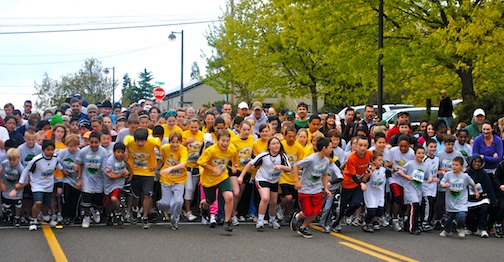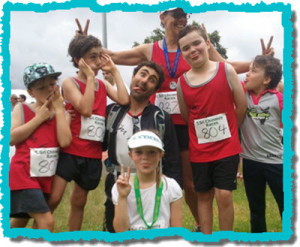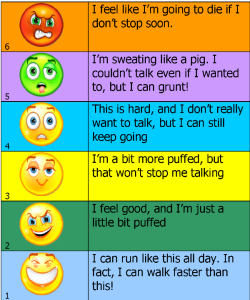
If you’re runner yourself, or you do some other form of exercise regularly, you’ll know just how good exercise can make you feel. I love that my kids love to move – they love all sorts of sports. Our neighbourhood gives them the perfect environment to be on the move constantly, trying out all sorts of games from cricket, basketball, street “ice” hockey, soccer, footy, swimming and cycling, and many more games which are the products of their own imagination.
I love that it keeps them physically fit, but the two things I really like about it are the social aspect of their activities, the negotiating and compromise, sprinkled with plenty of self-righteous indignation, and secondly, and just as importantly, that they are being set up for a life-long love of exercise.
That love of exercise is likely to come in pretty handy during their teenage years. It means there’s a good chance their teenage frustrations, experimentation, rebelliousness, risk taking, and energy overflow, will find a healthy outlet in sport. There’s a good chance they can use exercise to help elevate their mood if they’re feeling down, there’s a good chance they can go and run the streets to get their head together. There’s a good chance they’ll form some very strong and supportive friendships within a sporting team. And yes, I know. There’s an extremely good chance that they won’t be angels, no matter how much they exercise, and that I’ll soon be embarking on what could just be the most challenging years of my life.
We all want our kids to be safe and happy. Helping them to enjoy exercising is one thing we can do for them when they’re young, which could go a long way towards doing that. There’s an interesting article on exercise and depression, and how a group of teenagers use running to combat the black dog, which you can read here
How Running Helps Kids and Teenagers
- Distance running is a great sport in its own right, and it’s also a good way of getting fit for other sports. It can be of great value to kids who are lacking a bit of confidence when it comes to team sports, especially those sports which demand a high level of skill. With running, kids can very easily see how much they improve with a little persistence and tenacity, and they don’t have to compare themselves to anyone else.
- Simplicity – all they need is a pair of shoes and they can head out the front door and be running
- Efficient use of time – you can get maximum training benefits in only a short period of time. You can easily fit in a 10-20 minute run in a study break, and clear your head. Not so easy if you have to go somewhere before you can even start exercising. And you can get a high level of physiological benefit from short bursts of running.
- You don’t need expensive gear – shoes and a t-shirt and shorts and you’re done
- Running can improve your child’s aerobic capacity, meaning they can last longer before tiring in other sports such as soccer, netball, rugby and hockey. Note, however, that most kids pre-puberty are not capable of more than a 5-10% improvement in aerobic capacity, but they can greatly benefit from the additional improvement that can result from running more efficiently, learning how to pace themselves, and greater confidence and motivation.
- Running is a weight bearing exercise, which means it’s great for bone building. This is especially important for girls, as women are for more prone to osteoporosis than men are. In girls, 90% of peak bone mass will have been laid down by the time they are 18, and boys will have 90% of their peak bone mass by the age of 20. It’s vitally important then, that kids lay down bone mass in their teenage years. Bone mass can keep growing till about the age of 30, when it then holds reasonably steady. In the first few years after menopause, most women go through rapid bone loss which can lead to osteoporosis. We pretty much need to stock our bone bank as full as possible, before the body starts to make withdrawals from the account in later years.
- Running just makes you feel good. Some of you may disagree, but if you do it right, and don’t try to push yourself too much too soon, it really can make you feel awesome.
How do you encourage your kids to love sport?
The best way to get your kids involved in sport, is to do it yourself. Make sure your kids see you enjoying exercise, not doing it as a chore. Join them in a fun run, kick the ball around with them, play cricket, shoot a few hoops. Yes, sometimes it’s boring, and sometimes there are a million other things we think are more important to do, but if having your kids fit and active is important to you, then the best way to get them involved, is be involved yourself.
At a young age, kids should be encouraged to give as many sports as possible a go, not only the ones they think they are good at. Organised sports, or just mucking around with friends can keep kids physically fit, take their mind off schoolwork, help them to relax, and help them to make friends. In fact I was just talking to a friend yesterday who’s son started a new school this year, where most of the kids in his class were new to the school. He took his handball, picked the sportiest looking kids in his new class, and asked them to play. Hey presto. Instant rapport.
Doing a variety of sports will help with well balanced neuromuscular development, and team sports will help them to understand the selflessness often required for a team to be successful. Sports can also help give kids self-confidence, however if kids are pushed into sport in a win at all costs environment, it could have the opposite effect.
Encourage your child to be patient if they are not achieving their desired results. Show up to their events and cheer their improvements, regardless of whether they win or lose. There are very real physiological reasons why kids may not see massive improvements in their results, even if they are training the house down.
For kids who show promise at an early age, the temptation is to get them training, a lot. However very often, it’s a case of less is more. You’ll want to help them maintain their enthusiasm, whilst their body matures enough to be able to respond better to training. Understand that adult training programs aren’t going to be effective for kids. Kids and adults bodies work differently. No matter how many kms you have your 9 year old pounding out each week, (and risking injury) kids’ aerobic systems simply don’t respond to that kind of training in the same way we adults do. It’s important to keep training for kids fun, interesting, and importantly, appropriate to their development.
Hooked on Running kids’ running groups are conducted by highly experienced kids’ running coach Richard Sarkies. If you’d like some help getting your kids moving, and doing the right kind of training, leave your details and we’ll give you a call about a FREE TRIAL at our running groups for kids and teenagers.
Or if you’d like them to get some race experience and instruction, come along to one of our Kids Cross Country Races. The 5 race series begins Feb 22nd. Find out more


